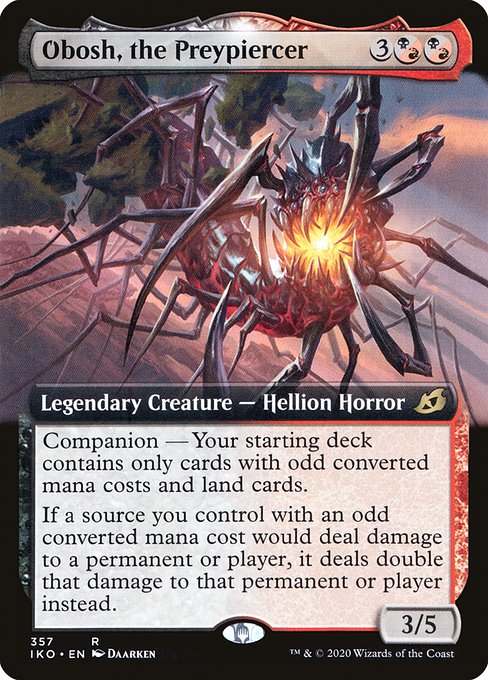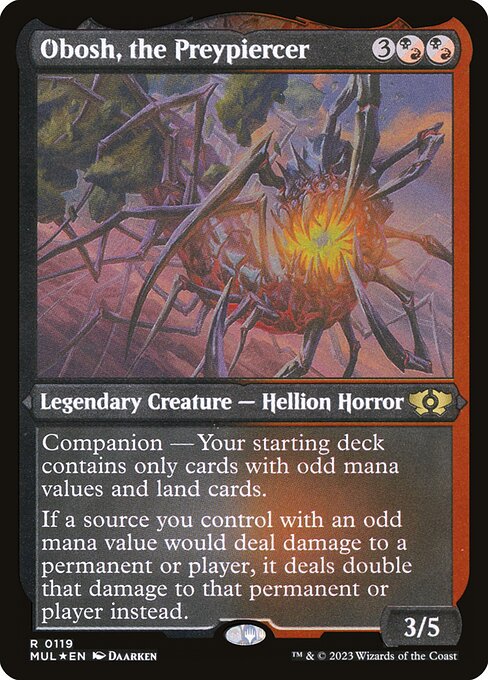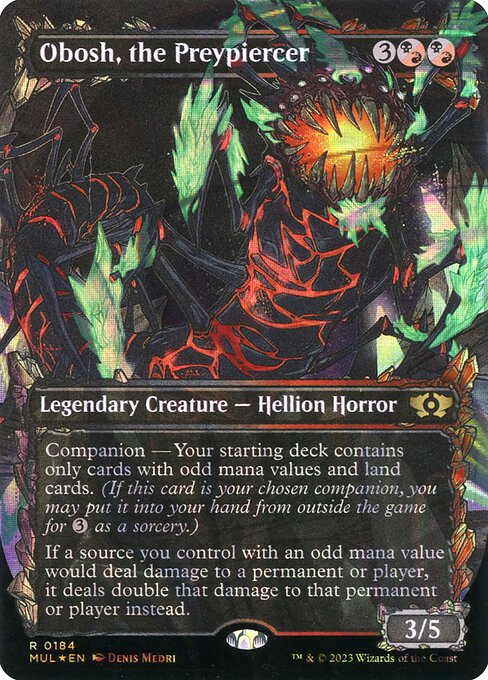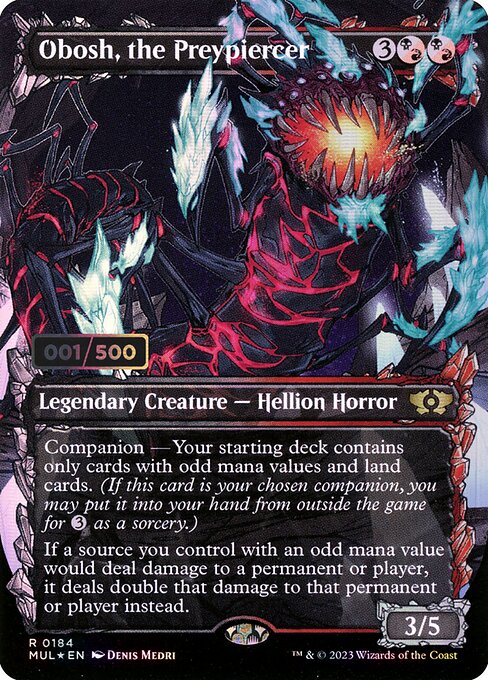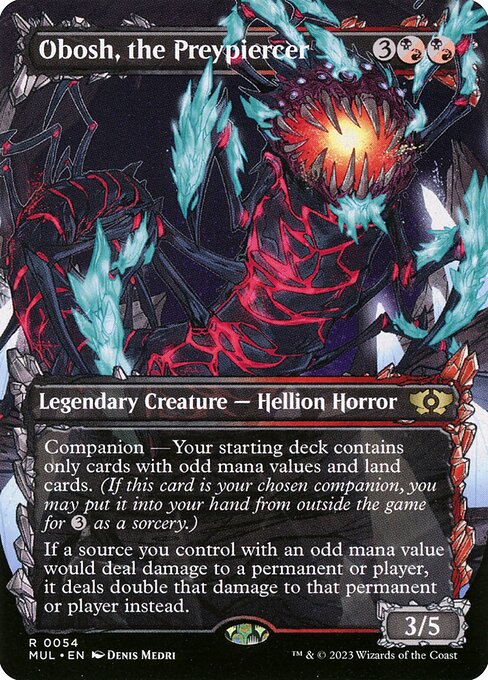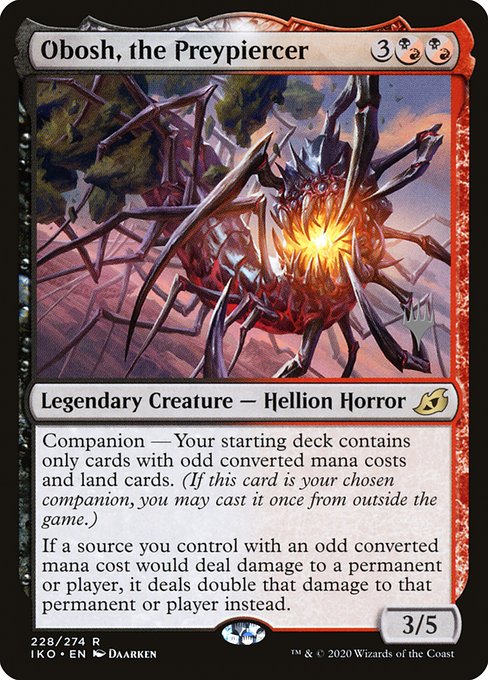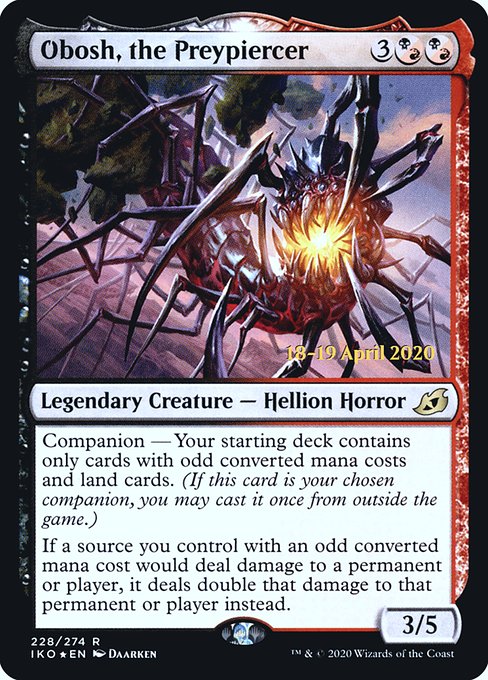Обош, Пронзатель Дичи
{B/R}{B/R}
Легендарное Существо — Геллион Ужас
Компаньон — Ваша начальная колода содержит только карты с нечетной конвертированной мана-стоимостью и карты земель. (Если эта карта является вашим избранным Компаньоном, то вы можете один раз разыграть ее из-за пределов игры.)
Если источник под вашим контролем с нечетной конвертированной мана-стоимостью должен нанести повреждения перманенту или игроку, вместо этого он наносит те повреждения тому перманенту или игроку в двойном размере.
Если источник под вашим контролем с нечетной конвертированной мана-стоимостью должен нанести повреждения перманенту или игроку, вместо этого он наносит те повреждения тому перманенту или игроку в двойном размере.
3/5
standard
future
historic
gladiator
pioneer
explorer
modern
legacy
pauper
vintage
penny
commander
brawl
alchemy
paupercommander
duel
oldschool
premodern
Rulings
For spells with in their mana costs, use the value chosen for X to determine the spell’s converted mana cost. If a permanent or card in any other zone has in its mana cost, X is considered to be 0.
The requirements of the companion ability apply only to your starting deck. They do not apply to your sideboard.
If an effect such as that of Ravenous Gigantotherium asks you to divide damage among targets, you must divide the unmodified damage before doubling it.
If a card in a player’s library has in its mana cost, X is considered to be 0.
You may have one companion in the Commander variant. Your deck, including your commander, must meet its companion requirement. Your companion is not one of your one hundred cards.
If a creature with trample you control would deal combat damage to a blocking creature while you control Obosh, you must assign its unmodified damage. For example, a 3/3 creature with trample blocked by a 2/2 creature can have 1 damage assigned to the defending player. It will then deal 4 damage to the blocking creature and 2 damage to the defending player.
The companion ability has no effect if the card is in your starting deck and creates no restriction on putting a card with a companion ability into your starting deck. For example, Zirda may be in your starting deck even if your other permanent cards don’t all have activated abilities.
If more than one player wishes to reveal a companion, the starting player does so first, and players proceed in turn order. Once a player has chosen not to reveal a companion, that player can’t change their mind.
Your companion begins the game outside the game. In tournament play, this means your sideboard. In casual play, it’s simply a card you own that’s not in your starting deck.
The companion’s other abilities apply only if the creature is on the battlefield. They have no effect while the companion is outside the game.
Before shuffling your deck to become your library, you may reveal one card from outside the game to be your companion if your starting deck meets the requirements of the companion ability. You can’t reveal more than one. It remains revealed outside the game as the game begins.
If multiple replacement or prevention effects try to modify damage that would be dealt to a permanent or player, the player or the controller of the permanent chooses the order in which they apply.
Wizards of the Coast has issued functional errata for the Companion mechanic. Instead of casting companions from outside the game: Once per game, any time you could cast a sorcery (during your main phase when the stack is empty), you can pay to put your companion from your sideboard into your hand. This is a special action, not an activated ability. It happens immediately and can’t be responded to. It can’t be countered or stopped by cards like Phyrexian Revoker. For more information please see https://magic.wizards.com/en/articles/archive/news/june-1-2020-banned-and-restricted-announcement
Once you put your companion into your hand, it behaves like any other card you’ve brought into the game. For example, if it’s countered or destroyed, it’s put into your graveyard, remaining in the game.
The damage is dealt by the same source as the original source of damage. The doubled damage isn’t dealt by Obosh unless it was the original source of damage.
The requirements of the companion ability apply only to your starting deck. They do not apply to your sideboard.
If an effect such as that of Ravenous Gigantotherium asks you to divide damage among targets, you must divide the unmodified damage before doubling it.
If a card in a player’s library has in its mana cost, X is considered to be 0.
You may have one companion in the Commander variant. Your deck, including your commander, must meet its companion requirement. Your companion is not one of your one hundred cards.
If a creature with trample you control would deal combat damage to a blocking creature while you control Obosh, you must assign its unmodified damage. For example, a 3/3 creature with trample blocked by a 2/2 creature can have 1 damage assigned to the defending player. It will then deal 4 damage to the blocking creature and 2 damage to the defending player.
The companion ability has no effect if the card is in your starting deck and creates no restriction on putting a card with a companion ability into your starting deck. For example, Zirda may be in your starting deck even if your other permanent cards don’t all have activated abilities.
If more than one player wishes to reveal a companion, the starting player does so first, and players proceed in turn order. Once a player has chosen not to reveal a companion, that player can’t change their mind.
Your companion begins the game outside the game. In tournament play, this means your sideboard. In casual play, it’s simply a card you own that’s not in your starting deck.
The companion’s other abilities apply only if the creature is on the battlefield. They have no effect while the companion is outside the game.
Before shuffling your deck to become your library, you may reveal one card from outside the game to be your companion if your starting deck meets the requirements of the companion ability. You can’t reveal more than one. It remains revealed outside the game as the game begins.
If multiple replacement or prevention effects try to modify damage that would be dealt to a permanent or player, the player or the controller of the permanent chooses the order in which they apply.
Wizards of the Coast has issued functional errata for the Companion mechanic. Instead of casting companions from outside the game: Once per game, any time you could cast a sorcery (during your main phase when the stack is empty), you can pay to put your companion from your sideboard into your hand. This is a special action, not an activated ability. It happens immediately and can’t be responded to. It can’t be countered or stopped by cards like Phyrexian Revoker. For more information please see https://magic.wizards.com/en/articles/archive/news/june-1-2020-banned-and-restricted-announcement
Once you put your companion into your hand, it behaves like any other card you’ve brought into the game. For example, if it’s countered or destroyed, it’s put into your graveyard, remaining in the game.
The damage is dealt by the same source as the original source of damage. The doubled damage isn’t dealt by Obosh unless it was the original source of damage.
Rulings
For spells with in their mana costs, use the value chosen for X to determine the spell’s converted mana cost. If a permanent or card in any other zone has in its mana cost, X is considered to be 0.
The requirements of the companion ability apply only to your starting deck. They do not apply to your sideboard.
If an effect such as that of Ravenous Gigantotherium asks you to divide damage among targets, you must divide the unmodified damage before doubling it.
If a card in a player’s library has in its mana cost, X is considered to be 0.
You may have one companion in the Commander variant. Your deck, including your commander, must meet its companion requirement. Your companion is not one of your one hundred cards.
If a creature with trample you control would deal combat damage to a blocking creature while you control Obosh, you must assign its unmodified damage. For example, a 3/3 creature with trample blocked by a 2/2 creature can have 1 damage assigned to the defending player. It will then deal 4 damage to the blocking creature and 2 damage to the defending player.
The companion ability has no effect if the card is in your starting deck and creates no restriction on putting a card with a companion ability into your starting deck. For example, Zirda may be in your starting deck even if your other permanent cards don’t all have activated abilities.
If more than one player wishes to reveal a companion, the starting player does so first, and players proceed in turn order. Once a player has chosen not to reveal a companion, that player can’t change their mind.
Your companion begins the game outside the game. In tournament play, this means your sideboard. In casual play, it’s simply a card you own that’s not in your starting deck.
The companion’s other abilities apply only if the creature is on the battlefield. They have no effect while the companion is outside the game.
Before shuffling your deck to become your library, you may reveal one card from outside the game to be your companion if your starting deck meets the requirements of the companion ability. You can’t reveal more than one. It remains revealed outside the game as the game begins.
If multiple replacement or prevention effects try to modify damage that would be dealt to a permanent or player, the player or the controller of the permanent chooses the order in which they apply.
Wizards of the Coast has issued functional errata for the Companion mechanic. Instead of casting companions from outside the game: Once per game, any time you could cast a sorcery (during your main phase when the stack is empty), you can pay to put your companion from your sideboard into your hand. This is a special action, not an activated ability. It happens immediately and can’t be responded to. It can’t be countered or stopped by cards like Phyrexian Revoker. For more information please see https://magic.wizards.com/en/articles/archive/news/june-1-2020-banned-and-restricted-announcement
Once you put your companion into your hand, it behaves like any other card you’ve brought into the game. For example, if it’s countered or destroyed, it’s put into your graveyard, remaining in the game.
The damage is dealt by the same source as the original source of damage. The doubled damage isn’t dealt by Obosh unless it was the original source of damage.
The requirements of the companion ability apply only to your starting deck. They do not apply to your sideboard.
If an effect such as that of Ravenous Gigantotherium asks you to divide damage among targets, you must divide the unmodified damage before doubling it.
If a card in a player’s library has in its mana cost, X is considered to be 0.
You may have one companion in the Commander variant. Your deck, including your commander, must meet its companion requirement. Your companion is not one of your one hundred cards.
If a creature with trample you control would deal combat damage to a blocking creature while you control Obosh, you must assign its unmodified damage. For example, a 3/3 creature with trample blocked by a 2/2 creature can have 1 damage assigned to the defending player. It will then deal 4 damage to the blocking creature and 2 damage to the defending player.
The companion ability has no effect if the card is in your starting deck and creates no restriction on putting a card with a companion ability into your starting deck. For example, Zirda may be in your starting deck even if your other permanent cards don’t all have activated abilities.
If more than one player wishes to reveal a companion, the starting player does so first, and players proceed in turn order. Once a player has chosen not to reveal a companion, that player can’t change their mind.
Your companion begins the game outside the game. In tournament play, this means your sideboard. In casual play, it’s simply a card you own that’s not in your starting deck.
The companion’s other abilities apply only if the creature is on the battlefield. They have no effect while the companion is outside the game.
Before shuffling your deck to become your library, you may reveal one card from outside the game to be your companion if your starting deck meets the requirements of the companion ability. You can’t reveal more than one. It remains revealed outside the game as the game begins.
If multiple replacement or prevention effects try to modify damage that would be dealt to a permanent or player, the player or the controller of the permanent chooses the order in which they apply.
Wizards of the Coast has issued functional errata for the Companion mechanic. Instead of casting companions from outside the game: Once per game, any time you could cast a sorcery (during your main phase when the stack is empty), you can pay to put your companion from your sideboard into your hand. This is a special action, not an activated ability. It happens immediately and can’t be responded to. It can’t be countered or stopped by cards like Phyrexian Revoker. For more information please see https://magic.wizards.com/en/articles/archive/news/june-1-2020-banned-and-restricted-announcement
Once you put your companion into your hand, it behaves like any other card you’ve brought into the game. For example, if it’s countered or destroyed, it’s put into your graveyard, remaining in the game.
The damage is dealt by the same source as the original source of damage. The doubled damage isn’t dealt by Obosh unless it was the original source of damage.
Votre collection ? vos decks ?
Envie de gérer votre collection et/ou créer des decks ?
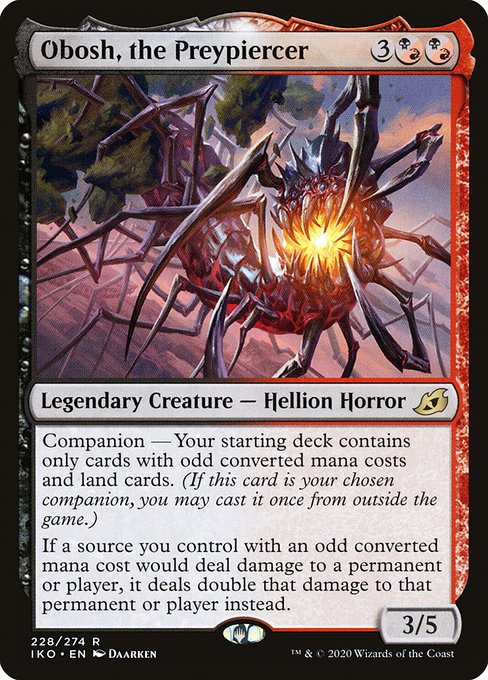

 0
0
 0.23€
0.23€
